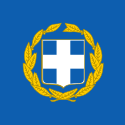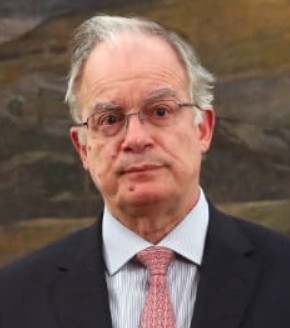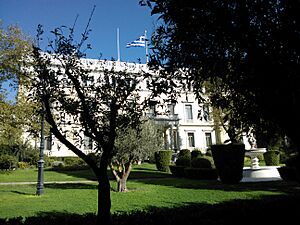President of Greece facts for kids
Quick facts for kids President of the Hellenic Republic |
|
|---|---|

|
|
| Style | His Excellency Mr. President (informal) |
| Seat | Presidential Mansion, Athens |
| Nominator | Parliamentary groups |
| Appointer | Hellenic Parliament |
| Term length | Five years,
renewable once
|
| Constituting instrument | Constitution of Greece (1975) |
| Inaugural holder | Michail Stasinopoulos (Third Republic) |
| Formation | 18 December 1974 |
| Deputy | President of the Hellenic Parliament |
| Salary | €138,732 annually |
The President of Greece is the official head of state for the country. This important role is also known as the President of the Hellenic Republic. The president is chosen by the Hellenic Parliament, which is Greece's main law-making body. Since 1986, the president's job has mostly been about representing the country, rather than making big political decisions. The office was officially created in 1975 with the Constitution of Greece. However, similar roles existed before, during the Second Hellenic Republic (1924–1935) and a military government in 1973–1974.
Contents
What the President Does
The President of Greece is the official commander-in-chief of the Greek Armed Forces. This means they are the highest-ranking person in charge of the military. The president also holds the top spot in the country's official order of importance. Even though the Greek Constitution of 1974 gave the president many powers on paper, in reality, the role has been mostly ceremonial. The Prime Minister is the main leader of the Greek government and the most powerful political figure. The president's role became officially ceremonial after a change to the constitution in 1986.
How the President is Elected
The President of Greece is elected for a five-year term. The election happens in the Hellenic Parliament during a special meeting. This meeting takes place at least one month before the current president's term ends.
Voting Process
The voting process can have up to five rounds, with no more than five days between each round.
- For the first and second rounds, a candidate needs a "supermajority" of 200 votes out of the 300 members of Parliament.
- If no one wins, the third round requires 180 votes.
- If still no winner, the fourth round needs a "simple majority" of 151 votes.
- The fifth and final round is decided by who gets the most votes, even if it's not a majority.
The President's Oath
Before starting their job, the President of Greece must take an oath. This is a special promise made in front of the Parliament. The oath is:
I swear in the name of the Holy, Consubstantial and Indivisible Trinity to safeguard the Constitution and the laws, to ensure their faithful observance, to defend the national independence and territorial integrity of the Country, to protect the rights and liberties of the Greeks and to serve the general interest and the progress of the Greek People.
What Happens if the President is Away
If the President of Greece is temporarily away because of illness, travel, or other reasons, the Speaker of Parliament steps in. The Speaker acts as president and uses the president's powers until the president returns. If the presidency becomes empty because of death, resignation, or another reason, the Speaker acts as president until a new president is elected. The most recent person to act as president was Ioannis Alevras in 1985.
Where the President Lives
The official home of the President of Greece is the Presidential Mansion. This building, once called the New Royal Palace, is located in the center of Athens.
History of the Presidency
The current government system in Greece, called the Third Hellenic Republic, began in 1974. This happened after a period known as metapolitefsi, which followed the end of a military government that had ruled Greece since 1967.
In 1973, the leader of the military government, Georgios Papadopoulos, ended the Greek monarchy and declared himself President. A vote in July 1973 confirmed this change and created a new constitution for a presidential republic. However, this attempt at a controlled return to democracy was stopped by another military leader, Dimitrios Ioannidis, in November 1973. Although the republic remained in name, the military still held the real power. Lt. General Phaedon Gizikis was appointed President, but Ioannidis was the true ruler behind the scenes.
After the military government fell in August 1974, and civilian rule returned under Konstantinos Karamanlis, the military government's actions were declared invalid. A new vote was held in December 1974, which confirmed that the monarchy was abolished. During this time, Gizikis remained president. After the vote, Michail Stasinopoulos became the first elected president.
A new constitution was put in place on June 11, 1975. It declared Greece a "presidential parliamentary democracy." In 1985, the constitution was changed to reduce the president's powers. These changes made the prime minister's position even stronger. The constitution has been updated several times since then, in 2001, 2008, and 2019, and is still used today.
Presidents of the Third Hellenic Republic
| President | Term of office | Political party | ||||
|---|---|---|---|---|---|---|
| No. | Portrait | Name (Birth–Death) |
Took office | Left office | Time in office | |
| 1 | Michail Stasinopoulos Μιχαήλ Στασινόπουλος (1903–2002) |
18 December 1974 | 19 July 1975 | 213 days | New Democracy | |
| A writer and legal expert, he was the first president after the monarchy was abolished. He was elected without opposition. | ||||||
| 2 |  |
Konstantinos Tsatsos Κωνσταντίνος Τσάτσος (1899–1987) |
19 July 1975 | 10 May 1980 | 4 years, 296 days | New Democracy |
| A legal expert and government minister, he was elected by Parliament. | ||||||
| 3 |  |
Konstantinos Karamanlis Κωνσταντίνος Καραμανλής (1907–1998) |
10 May 1980 | 10 March 1985 (resigned) |
4 years, 304 days | New Democracy |
| He was Prime Minister before becoming president. He resigned before his term ended. | ||||||
| – |  |
Ioannis Alevras Ιωάννης Αλευράς (1912–1995) |
10 March 1985 | 30 March 1985 | 20 days | PASOK |
| As Speaker of Parliament, he served as acting president after Karamanlis resigned. | ||||||
| 4 |  |
Christos Sartzetakis Χρήστος Σαρτζετάκης (1929–2022) |
30 March 1985 | 4 May 1990 | 5 years, 35 days | Independent |
| A legal expert, he was supported by the PASOK party and the Communist Party of Greece. | ||||||
| (3) |  |
Konstantinos Karamanlis Κωνσταντίνος Καραμανλής (1907–1998) |
5 May 1990 | 10 March 1995 | 4 years, 310 days | New Democracy |
| He served a second term as president, elected after a new election was held. | ||||||
| 5 |  |
Konstantinos Stephanopoulos Κωνσταντίνος Στεφανόπουλος (1926–2016) |
10 March 1995 | 12 March 2005 | 10 years, 2 days | Independent |
| He was a long-serving Member of Parliament and minister. He was re-elected for a second term in 2000. | ||||||
| 6 |  |
Karolos Papoulias Κάρολος Παπούλιας (1929–2021) |
12 March 2005 | 13 March 2015 | 10 years, 1 day | PASOK |
| A PASOK party member and minister, he was elected for two terms without opposition. | ||||||
| 7 |  |
Prokopis Pavlopoulos Προκόπης Παυλόπουλος (born 1950) |
13 March 2015 | 13 March 2020 | 5 years | New Democracy |
| A New Democracy party member and minister, he was elected in 2015. | ||||||
| 8 |  |
Katerina Sakellaropoulou Κατερίνα Σακελλαροπούλου (born 1956) |
13 March 2020 | 13 March 2025 | 5 years | Independent |
| She was the President of the Council of State before becoming the first woman President of Greece. | ||||||
| 9 |  |
Konstantinos Tasoulas Κωνσταντίνος Τασούλας (born 1959) |
13 March 2025 | Incumbent | 342 days | New Democracy |
| A New Democracy party member and former Speaker of the Hellenic Parliament, he became president in March 2025. | ||||||
See also
 | Audre Lorde |
 | John Berry Meachum |
 | Ferdinand Lee Barnett |



